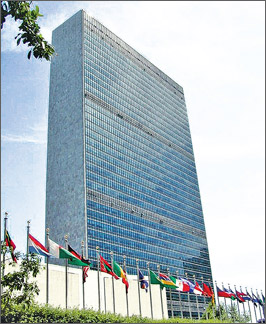The Charter of the United Nations
Jayantha DHANAPALA
|

United Nations building in New York
|
|

Jayantha Dhanapala |
Sixty-seven years ago, the Charter of the United Nations was signed.
That was on June 26, 1945, in San Francisco, at the conclusion of the
United Nations Conference on International Organization. The Charter
came into force on October 24, 1945. The Statute of the International
Court of Justice is an integral part of the Charter. There are many who
believe that if the drafting of the Charter were to be conducted today
no consensus agreement would be reached on it.
In many ways the Charter represents the constitution of the United
Nations and forms the bedrock of international law. The Congress of
Vienna in 1815 sought to reorder the shape of Europe after the
Napoleonic Wars. That order survived till the 1914-18 World War.
Equality of all nations
The Treaty of Versailles and the League of Nations then attempted to
establish a new world order but inherent deficiencies and Adolf Hitler's
Nazi policies rent it asunder.
Thus the UN Charter is an ambitious redrawing of the world order and
that it has survived almost seven decades despite vast global changes is
a tribute to its architects.
The Charter consists of a Preamble and 19 Chapters. There is
provision for amendments and the amendments that have been adopted have
included those relating to the composition and voting procedures of the
Security Council and the membership of the Economic and Social Council.
The Charter is a very pragmatic document and combines the soaring
aspirations of humankind with the hard realities of power politics. Read
together with the Statute of the International Court of Justice and the
Declaration of Human Rights it is a delegitimisation of wars of
aggression and a reaffirmation of the rule of international law, human
rights, equality of all nations and the promotion of economic and social
advancement for all peoples.
The Charter also forms the value base of the organization setting out
the purposes and principles of the UN in the Preamble and in Chapter 1.
That has been the ethical foundation on which the UN has built its
work over the years. For example, the Millennium Declaration adopted in
September 2000 identified the shared values of the UN community as
Freedom, Equality, Solidarity, Tolerance, Respect for Nature and Shared
Responsibility.
There has also been a consensus established that the core areas of
the UN's work are in peace and security, human rights and development
and that all three of these areas are interconnected and interlaced so
that you cannot have one without the other.
Democratic principle
The architects of the UN wisely built into the organization an
indispensable equilibrium amongst the principal organs of this world
body benefiting from the experience of the League of Nations.
Thus while the General Assembly functions as the Parliament of
Nations based on the democratic principle of the sovereign equality of
nations (Article 2:1) making recommendations on a wide range of issues
and approving the budget, it is the Security Council that acts on behalf
of the UN members in its primary responsibility for the maintenance of
international peace and security using the powers vested in it under
Chapter VI - Pacific Settlement of Disputes - and Chapter VII - Action
with Respect to Threats to the Peace, Breaches of the Peace, and Acts of
Aggression.
Amidst the unfulfilled demands for the reform of the Security
Council, and especially its enlargement, tensions appear to have grown
between the General Assembly and the Security Council.
The current debate on UN reform has been seriously complicated by
deep-seated concerns that, under the guise of reform, attempts are being
made to change the equilibrium that is inherent in the Charter.
The need for change is recognized. That however should not be an
occasion for a struggle for power over the organization by one group of
countries over the other. Whether it is a group enjoying the power of
the purse or the power of the majority we need to allow the equilibrium
to remain as difficult as it may be. To upset it is to unravel the
Charter.
Jayantha Dhanapala is a former UN Under-Secretary-General and a
life member of United Nations Association of Sri Lanka (UNASL) |



